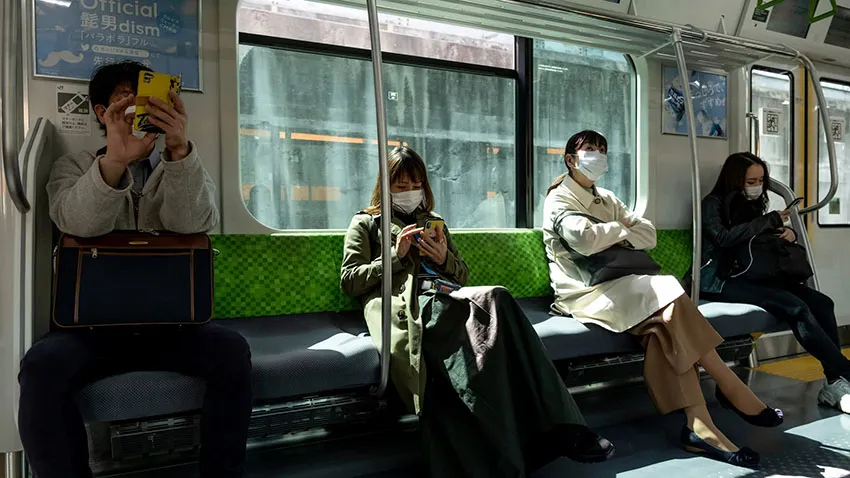
Residents in Tokyo, Osaka and five other prefectures have been asked to refrain from going out. The plea came after the central government on Wednesday decided to become more aggressive in combating the novel coronavirus and declared a state of emergency. Aichi prefecture declared one of its own on Friday.
The request that residents of big metropolitan areas stay home came out of the belief that by reducing social contact by 80% in those areas, these population centers can stymie the virus.
The target and instructions to stay home as much as possible are similar to the policies put forward by a British research group, and they provide Japan with perhaps its only viable plan to try to prevent the virus's explosive growth.
"The important thing," a specialist in Japan said, "is how thoroughly [these ideas] can be put into practice."
The U.K., which has already requested people refrain from going out, can serve as a reference point.
The British government initially did not restrict people's movements as it instead tried to bet on something called "herd immunity." Authorities convinced themselves that the situation would resolve itself once a large number of people gained immunity to the virus. Ride out the pandemic, the theory promised, and economic impact would be minimal.
But infections and deaths continued to spread. Prime Minister Boris Johnson himself had to be admitted to intensive care after contracting the virus. He has since been released from the ICU.
A team of specialists at Imperial College London eventually persuaded the U.K. leadership to discard its herd immunity hopes with a forecast that about 510,000 deaths would come by August if the situation continued and no additional measures were taken.
The specialists' report also says that if school closures and other strict measures were taken, it would be possible to limit total deaths to between 8,700 to 39,000. Reducing social contact rates by 75% is a prerequisite for getting the situation under control, it says.
Among the means of transmission are sneezes and coughs, which spray droplets of phlegm that the virus hitches rides on.
One virus carrier is said to transmit the disease to two to three other people, according to studies. If that can be brought down to one person or less, the fast spread of the infection would be checked.
"If we reduce contact between people by 80%, we can reduce the number of additional people infected to one or less," Hiroshi Nishiura, a professor at Hokkaido University, explained in a video posted by the public Twitter account of the health ministry's cluster response team.
In a hypothetical calculation in which one person transmits the virus to 2.5 people, social contact could be reduced by 60% and the virus could still be brought under control. But because there are those who will not refrain from going out for dinner and drinks, or engaging in other high-risk activities, "to stop the infection at a societywide level, the target was set at the higher level of 80%," Nishiura said.
Restricting people's movement has a large impact on society and the economy. However, it is seen as unavoidable, as controlling the spread of the infection as quickly as possible is the best way to minimize long-term damage.
But it can be difficult to decide what activities to restrict and what ones are appropriate during the state of emergency.
Experts advise that in addition to ordinary preventive measures, such as avoiding poorly ventilated areas, people should limit face-to-face interactions as much possible and think carefully about how they could become infected.
Some specialists think Japan could try to control the spread without focusing on the 80% goal. They talk about the "three Cs" -- closed spaces with poor ventilation, crowded areas and close-contact settings. "If people thoroughly avoid places where the three Cs overlap," said Mitsuyoshi Urashima, a professor at the Jikei University School of Medicine, "it may be similarly effective, even without people reducing their social contact by 80%."
There are also some who think that even if people successfully reduce their social contact by 80%, it will not be enough to stop the pandemic. "In the case of Tokyo, it needs to drop by 98%," said Aki-Hiro Sato, a professor at Yokohama City University who specializes in data science. If the virus spreads in urban centers like it did in Europe, people will need to limit their time outside to 110 minutes per week, he added.
There are several different models that estimate the spread of infections, and they are all based on different assumptions. As a result, they all come to different conclusions, meaning it is necessary to constantly reevaluate the situation and reconsider what actions to take.




















